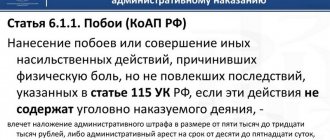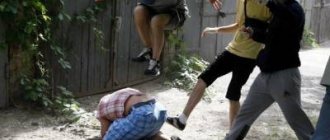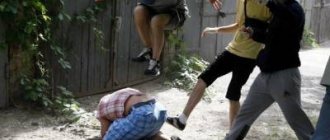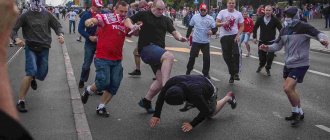For beating (multiple beatings), depending on the motives of the rapist, you can be brought to administrative or criminal liability. Punishment for beatings is enshrined in Art. 6.1.1 of the Code of Administrative Offenses (CAO) of the Russian Federation.
Administrative liability occurs only if the offender caused minor harm to the opponent’s health.
Punishment for beatings that were inflicted on an individual with a specific motive and caused more serious harm to health is provided for in Art. 116 of the Criminal Code (CC) of the Russian Federation.
It is often difficult even for law enforcement officials to distinguish between administrative and criminal liability for beating.
Administrative punishment for beatings appeared relatively recently - in 2016. And the line between an offense and a crime is very thin.
Beating a person should not result in a minor but permanent loss of his ability to work. Also, beatings should not cause short-term health problems for the victim.
These rules are the same for both administrative and criminal liability. If they are violated, then the person will be judged according to Art. 115 of the Criminal Code of the Russian Federation. Read more about this in the material “What is minor harm to health?”
The main difference between a crime and a misdemeanor battery is the motive of the perpetrator. But even to identify it requires not only the assistance of law enforcement officers, but also psychologists and, of course, the defense.
A lawyer who understands the facets of administrative and criminal liability will be able to mitigate the punishment from justice.
Do you want to figure it out, but don’t have time to read the article? Lawyers will help
Entrust the task to professionals. Lawyers will complete the order at the cost you specify
214 lawyers on RTIGER.com can help with this issue
Solve the issue >
For what kind of beatings and to whom is only a fine issued?
When inflicting light beatings on a stranger, administrative liability may be imposed. Responsibility is assigned in accordance with the provisions of Article 6.1.1 of the Code of Administrative Offenses of the Russian Federation, which provides for a minimum punishment in the form of a fine, compulsory administrative or correctional labor.
REFERENCE: Fines can be issued to persons who have reached the age of 16 and are imposed to be paid to their legal representatives.
Light battery refers to multiple blows to the victim's face or body. The number of blows to impose administrative liability must be at least two and should not lead to serious consequences for the victim.
Here the punishment follows not for the consequences caused in the form of harm to health, but for the infliction of pain and humiliation of the victim’s personality. The fine for simple beatings reaches 40,000 rubles.
In this case, the victim should not be one of the close relatives or cohabitants, and the perpetrator should not have previously been brought to administrative or criminal liability for this type of offense.
In other cases, more stringent measures are taken to suppress domestic assault or other actions leading to street fights and beatings for one reason or another.
What liability is provided for assault under the Criminal Code of the Russian Federation? And other nuances that will help you better understand the provided punishments:
- Classification of beatings.
- What is mild battery and what is the liability for it?
- What is moderate battery and responsibility for it.
Corpus delicti
The legislation provides for administrative or criminal liability for beatings under Art. 6.1.1 Code of Administrative Offenses and Articles 116, 116.1 and 117 of the Criminal Code. They have a similar composition with some differences in the object of the crime (Article 116.1 of the Criminal Code) and motives (Article 116 of the Criminal Code).
An object
Beatings violate a person’s right to physical integrity, humiliate him as a person, and damage the health and mental state of the victim.
Objective side
“Battery” refers to blows or other acts of a violent nature directed against the victim and causing pain:
- pinching;
- bites;
- hair pulling;
- twisting of limbs;
- pinching or squeezing of a body part;
- flogging.
Number of beats
Strikes or other actions must be performed multiple times (more than twice). Inflicting one blow cannot be considered beating. This violation (in the absence of harm to health) will be classified as hooliganism under the Criminal Code of the Russian Federation or insult.
Consequences of the beating
Additionally
, in the case where the beatings did not violate the anatomical integrity of the body tissues, but led to physical pain and ailments, they will also be taken into account in the medical report. The forensic expert will record the victim’s complaints and also indicate that there are no visual signs of damage and the severity of the harm has not been determined.
Beatings can do without visible consequences or leave superficial damage on the body:
- abrasions;
- scratches;
- bruising;
- bruises;
- small wounds.
However, they do not lead to temporary or permanent disability. Although, such consequences may not occur immediately, but over time. In this case, the act will be reclassified as “harm to health” under articles of the Criminal Code - 115, 112 or 111, depending on the severity of the injuries. The article https://lexconsult.online/6615-osobennosti-provedeniya-sudebno-meditsinskoi-ekspertizy-tyazhesti-vreda-zdorovyu discusses the criteria for determining the severity of harm to health.
Subject
Responsibility for battery is borne by an individual aged 16 years or older who was in a sane state at the time of the commission of the crime. Taking into account the changes made to the Criminal Code by Federal Law No. 323 of July 3, 2016, the subject of a crime classified under Art. 116.1 of the Criminal Code, is a close relative of the victim:
- spouse;
- parent (adoptive parent);
- son (daughter), including adopted one;
- sibling;
- grandfather grandmother);
- grandson;
- brother-in-law, matchmaker;
- guardian (trustee);
- person running a joint household.
For amendments to Article 116 of the Criminal Code of the Russian Federation “Beatings”, see the following video
Subjective side
An unlawful act is committed with direct intent - causing pain to the victim is the conscious goal of the offender. If the damage was caused unintentionally, it is identified as minor harm to health caused by negligence (you can read about unintentional harm to health). This violation is not subject to criminal penalties. However, the victim can file a civil lawsuit against the perpetrator and recover compensation from him for material and moral damage.
The motives for the beating affect his qualifications. Thus, criminal liability for beatings under Art. 116 of the Criminal Code threatens a criminal who has committed an act from:
- Hooligan motives.
- Ideological principles.
- Hatred towards representatives of a certain:
- political group;
- race or nationality;
- religion;
- social group.
If the beating occurred out of personal hatred towards the victim, the violation will be qualified under Art. 6.1.1 Code of Administrative Offences.
Who has the right to collect according to Art. 6.1.1 Code of Administrative Offenses of the Russian Federation?
Depending on the application of certain legal norms, fines are issued by the relevant authorities:
- When administrative liability is imposed in accordance with the norms of Article 6.1.1 of the Code of Administrative Offenses of the Russian Federation, sanctions for collection are issued in the district administration of the locality at the place of residence of the culprit.
- For a criminal offense, the collection of a proportionate amount is based on the decision of the magistrate court at the place of residence of the defendant.
Other authorized persons and representatives of authorities have no right to levy a fine for beatings.
In the event of an administrative penalty, an administrative order is issued, which indicates the amount of the amount charged as punishment and the deadline for payment. Upon a court decision, the same information is given in an extract from the protocol of the court decision.
When determining the amount of the penalty, the consequences of the beating are taken into account. There is no officially established regulation on their mutual conditionality.
But almost always the authority considering the scope of sanctions is based on the criteria of the consequences of the offense for the victim.
That is, the more significant the consequences of beatings in the form of damage to the victim’s health, the higher the amount charged from the perpetrator.
If the classification of beatings reaches a moderate degree of severity, then penalties are no longer imposed; a more severe punishment follows.
How to properly record and prove beatings?
Article 20 of the Code of Criminal Procedure of the Russian Federation, most criminal charges related to causing harm to health of mild severity, relate to cases of private or private-public prosecution. Therefore, to conduct an investigation into the facts of strikes, the following nuances will be taken into account:
- part one art. 115 of the Criminal Code of the Russian Federation is classified by law as cases of private prosecution - criminal cases can be initiated only if there is a statement from the victim, and the parties can terminate the process at any time through reconciliation;
- Article 116 of the Criminal Code of the Russian Federation is classified as cases of private-public accusation - only the statement of the victim can be the basis for criminal prosecution, however, the fact of reconciliation of the parties will not entail the mandatory termination of the case (only investigative authorities or the court have the right to make a decision to terminate the case based on this composition, even if the parties have no claims against each other);
- part two art. 115 of the Criminal Code of the Russian Federation is a matter of public prosecution - law enforcement agencies are obliged to initiate a case upon detection of a crime, even if the victim has not filed a statement with the police.
Find out more Systematic beatings: article of the Criminal Code, punishment, what to do
To record a beating, immediately after a fight or other variant of multiple blows, you need to contact the police. Based on the submitted application, the victim must be given a referral for examination by a medical expert. It is the expert’s opinion that will be important for the further qualification of the case. The police are obliged to initiate a criminal case only if they establish a health disorder or loss of ability to work. Also, criminal prosecution will follow if special motives of the offender are identified.
Since part one of Art. 115 of the Criminal Code of the Russian Federation is a matter of private prosecution; the victim’s statement will be refused to initiate a criminal case. At the same time, the right to submit documents to the magistrate’s court is clarified, where a criminal case is initiated at the request of the victim. Procedural materials collected by the police during the pre-investigation check will be sent to the court for consideration of the case. In addition to other documents, forensic medical examination materials will also be sent.
Can the victim himself go to a medical institution to record the beatings? The law does not prohibit self-referral to medical specialists. However, if a dispute arises about the nature of the damage, a forensic examination may be ordered during the consideration of the case.
The amount of fines for certain types of offenses
When beating a loved one, as well as when intentionally causing minor harm to health, punishment in the form of a fine is also sometimes provided. According to the provisions of Article 115 of the Criminal Code of the Russian Federation, if the consequences of damage to health are insignificant, and the person who caused them is subject to charges for the first time, a fine of 40,000 rubles is also imposed. At the discretion of the court, it may be replaced by payment of an amount commensurate with three months of income received.
Under Article 116 of the Criminal Code of the Russian Federation, fines are levied in a significantly larger volume, reaching 100,000 rubles.
Such cases are provided for when qualifying the crime of battery:
- group beating;
- beating for hooligan reasons;
- beating a child.
The population of the husband in relation to the wife has its own characteristics. We talked about where and how to film a husband beating him and what the punishment would be for beating his wife. Check them out if this is your situation.
However, in this case, predominantly, criminal liability arises with the qualification of Part 2 of the applicable articles, which provides for a more significant punishment than a fine.
If blows motivated by jealousy are inflicted on a third party without leaving significant marks or causing harm to health, then administrative liability arises, according to which fines levied are limited to 40,000.
Also, jealousy arising from the guilty actions of the victim, in the form of provocation, can lead to legal consequences of determining the nature of the crime as committed in a state of passion.
In this and other cases, the law does not provide for the payment of a fine. Here, the provisions of Article 113 of the Criminal Code of the Russian Federation apply if the consequences of damage to health are no less than moderate.
If the state of passion does not lead to significant harm to the victim, the perpetrator may be released from liability, or a fine may be awarded in accordance with the provisions of Article 115 of the Criminal Code of the Russian Federation or 6.1.1 of the Code of Administrative Offenses of the Russian Federation.
For systematically inflicted beatings, no fine is charged, since liability occurs within the framework of the provisions of Article 117 of the Criminal Code of the Russian Federation - torture, where penalties are not provided.
Other types of beatings may include violent acts directed at one’s own child or another minor.
A minor offender may get away with a fine, while an adult and capable offender will face more severe penalties.
Responsibility for beatings
There will be no reconciliation
If previously there was a criminal charge for beatings that was a private charge (that is, the case was initiated only at the request of the victim), now, after changes have been made, it has become a private-public charge (a statement from the victim is also required, but further on the material a decision must be made to initiate a criminal case and mandatory sending it to the district court with an indictment or indictment). That is, if previously, during the reconciliation of the parties, the victim could withdraw his statement, now it is impossible to do this.
Battery that does not cause harm to health is subject to punishment under the following articles:
- 6.1.1 Code of Administrative Offences, if the offender committed the act out of hatred personally towards the victim.
- 116.1 of the Criminal Code, if:
- signs of violation are similar to those mentioned in Art. 6.1.1 Code of Administrative Offences;
- the culprit has already been brought to justice under Art. 6.1.1 Code of Administrative Offences;
- the victim is a close relative of the offender.
Administrative punishment
Art. 6.1.1 The Code of Administrative Offenses provides for the application of one of the following measures to the violator:
- a fine in the amount of 5,000 to 30,000 rubles;
- detention for a period of 10 to 15 days;
- mandatory work for a period of 60 to 120 hours.
Responsibility for repeated violation
If the culprit has already been punished under Art. 6.1.1 and again committed a similar act in relation to a close relative, he is liable under Art. 116.1 CC. The violator is considered subject to an administrative penalty within a year after its imposition (Article 4.6 of the Administrative Code). According to Art. 116.1, the perpetrator faces criminal liability for repeated beatings in the form of:
- a fine of up to 40,000 rubles;
- compulsory work for 240 hours or less;
- correctional labor for up to 6 months. maximum;
- arrest up to 3 months or less.
Criminal liability for battery
A crime qualified under Art. 116 of the Criminal Code, punishable by:
- compulsory work for 360 hours or less;
- corrective labor, the maximum period of which does not exceed a year;
- restriction of freedom for 2 years or less;
- forced labor for a period not exceeding 2 years;
- arrest for up to 6 months;
- imprisonment for up to 2 years.
The video contains information about tougher penalties for beating loved ones
Punishment for systematic beating
Beatings or other violent acts (including psychological oppression of the victim), which do not cause harm to health, but are committed regularly, are qualified under Art. 117 of the Criminal Code as torture. The article contains two points.
Paragraph 1
Liability for personal injury:
- restriction of freedom for a maximum of 3 years;
- forced labor for up to 3 years;
- imprisonment for 3 years or less.
It is worth noting: The Criminal Code does not provide for a separate punishment (or a separate article) for beating minors. But a number of legislative norms regulating liability for physical violence consider the young age of the victim as an aggravating circumstance that increases the punishment. Persons under the age of 14 are considered minors; persons from 14 to 18 years of age are minors.
Point 2
An unlawful act may be aggravated by the following circumstances:
- There was more than one casualty.
- The person was beaten:
- performing official or public duties;
- under the age of majority;
- obviously unable to resist at the time of attack;
- dependent on the offender, financially or otherwise;
- knowingly being pregnant;
- kidnapped and deprived of freedom of movement.
- several persons;
- political group;
In this case, the perpetrator will be punished with imprisonment for a period of 3 to 7 years.
Who is exempt from paying the assigned amount?
If sanctions are imposed on a juvenile offender, then his responsibility is delegated to the parents. For children who do not have parents, adoptive parents or guardians, the payment of the fine may be waived. In this case, the punishment is replaced - mainly with forced correctional labor.
Such action may be taken against other fined offenders if they are unemployed and do not have any income. In order to cancel the fine and replace it with correctional labor, you need to contact the district administration, where the decision was made to levy a proportionate amount of money. A statement is written to the chairman of the administrative commission that made the decision on the penalty, asking for a replacement of the punishment.
Payment of the assigned amount will need to be made before the end of the period specified in the administrative act. You can request a deferment of payment of funds for a period of 3 months by writing a statement to the chairman of the administrative commission requesting a deferment. A postponement is allowed at the discretion of the commission members.
You can appeal an administrative decision to impose penalties in a district court within 10 days after receiving the administrative act on the penalty. If the perpetrator has received a penalty in a criminal case, it is permissible to challenge the decision of the district court in the regional court. A period of 10 days is also allotted for this, after the issuance of an extract from the court decision, into the hands of the perpetrator.
The fine is paid:
- at a Sberbank branch;
- in the terminal;
- on the government services website.
If it is not paid on time, a penalty of up to 20% of the total amount accrued as collection is allowed.
IMPORTANT: In addition, the authorized authority has the right to demand a proportionate amount of an additional fine, in the amount of the current interest rate at the Bank of Russia exchange rate, for the illegal use of money.
If the culprit has not paid the assigned amount of money within three years, and the authorized authority has overlooked this violation, the debt claim loses legal force in accordance with the established statute of limitations.
Before the expiration of the three-year period, the property of the debtor upon payment of the fine may be seized and sold at auction. To do this, the administration submits a request for debt collection to the Bailiff Service.









